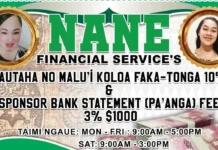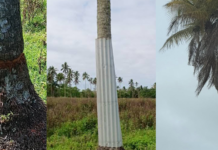Analysis—Australian Foreign Minister Penny Wong’s recent visit to Tonga underscores Australia’s role as the kingdom’s largest development and security partner while reinforcing the importance of trust in bilateral relations.
Wong’s emphasis on valuing Tonga’s trust signals a mutual expectation of reliability in aid delivery and Tonga’s stewardship of foreign assistance.
She said: “But you know what we value most? We value most your trust. That is what we value most. That is why we are here. And that is why we want to continue to be, trusted friends.”
She then announced a $50 million commitment over four years for governance, health, and gender equality initiatives, alongside an additional 5 million in budget support, which reflects Australia’s strategic investment in Tonga’s stability.
The Australian contribution, as we can see from the Senator’s message, was intended to support “economic resilience” and was a means for Australia to help Tonga acquire a strong foundation for a “long-term sustainability”.
The 2021 Australian Census recorded over 40,000 Tongan residents, reflecting the community’s perception of Australia as a crucial destination for socioeconomic advancement.
Diplomatic mālie
From an analytical perspective, Wong’s speech can be interpreted in the Tongan context as lea mālie—a term denoting interesting, significant, and impactful speech. Her words were mālie in the sense that the two remarkable terms she employed were simple yet profound, not to mention informative and edifying: “value” and “trust.”
While these may seem like ordinary words, they carried deep meaning within the context of Wong’s speech. By emphasising “trust,” she referred to the bedrock of the relationship between Tonga and Australia, a foundation without which connections risk becoming fragile, transactional, or unsustainable.
When she stated that Australia “values” Tonga’s trust, she highlighted this Tongan virtue as key to the level of integrity both nations must uphold to maintain their strong bilateral ties. In diplomatic and professional contexts, this principle of mutual trust and value defines the enduring relationship between Tonga and Australia.
Cultural reciprocity
In the Tongan context, trust fosters fetauhi‘aki ‘o e vā, the nurturing of mutual reciprocity within relationships. The two most integral components of fetauhi‘aki are tauhi fatongia (fulfilling cultural obligations) and tauhi e faka‘apa‘apa (maintaining respect tied to mana and tapu).
For example, fatongia requires a brother to gift the first fruits of his harvest to his sister or mehekitanga (paternal aunt). In return, she reciprocates with kafu (traditional ngatu or precious mats) and ointment, fulfilling their reciprocal obligations.
Similarly, the concept of faka’apa’apa, especially the one known as veiptaui, requires brothers to avoid public gatherings with their sisters to preserve sacred sibling decorum. Sisters, in turn, extend the same respect when their brothers are present. This practice prevents breaches of respect, such as exposure to inappropriate language from those unaware of their familial ties. It reflects the broader Tongan cultural framework that upholds relational harmony, or vā, even in transnational contexts like Tonga-Australia relations.
While Tonga’s political system and emerging democracy may lack fully developed Western-style mechanisms of transparency and accountability, its deeply rooted traditions of fetauhi‘aki (reciprocity) within the vā provide an alternative foundation for sustaining bilateral ties. Thus, despite institutional gaps, Tonga’s cultural resilience ensures robust relations with Australia without relying solely on formal governance structures.
The essence of fetauhi‘aki lies in mutual growth, where both parties thrive in all aspects, whether economic, material, or holistic well-being. It is now Tonga’s fatongia to take decisive action and work toward financial self-sufficiency, reducing its reliance on Australian assistance.
Conditional assistance
Australia may continue assisting Tonga if it observes the successful utilisation of its four-year financial assistance program. However, what matters most is whether Tonga demonstrates tangible progress in meeting these objectives. Suppose Australia determines that Tonga has fulfilled these goals. In that case, it might redirect its assistance to more pressing needs, such as providing direct support to vulnerable groups, including single mothers and unemployed youth, through benefit payments or targeted programs.
Achieving this goal would not be unprecedented for Tonga, as historical examples demonstrate its feasibility. The country previously generated approximately $150 million through its controversial passport sales program, though these funds were ultimately lost through unreliable investments in the United States.
Tonga must urgently address systemic issues of financial mismanagement. Historical examples remain instructive:
The 2004 collapse of Royal Airlines, which lost about $30 million.
The current government’s questionable use of $2 million in Australian aid for the failing Lulutai Airlines by the Hu‘akavameiliku government.
The loss records of how the $60 million COVID-19 budget was spent.
Systemic Failures
These repeated failures represent more than financial missteps, they constitute a breach of Tonga’s fatongia (cultural obligations) to its citizens and international partners.
As Foreign Minister Wong said, Australia envisions a future where Tonga can shape its own destiny, remaining strong and independent.
Tonga’s ability to demonstrate its commitment to tauhi vā (the maintenance of relationships) through tauhi fatongia and tauhi faka’apa’apa and to practice disciplined budgeting will be crucial for sustaining its partnership with Australia.
The moral alignment between Canberra and Tonga adds pressure on lawmakers to prioritise honest fetauhi’aki, or risk losing the trust of their largest development ally.







